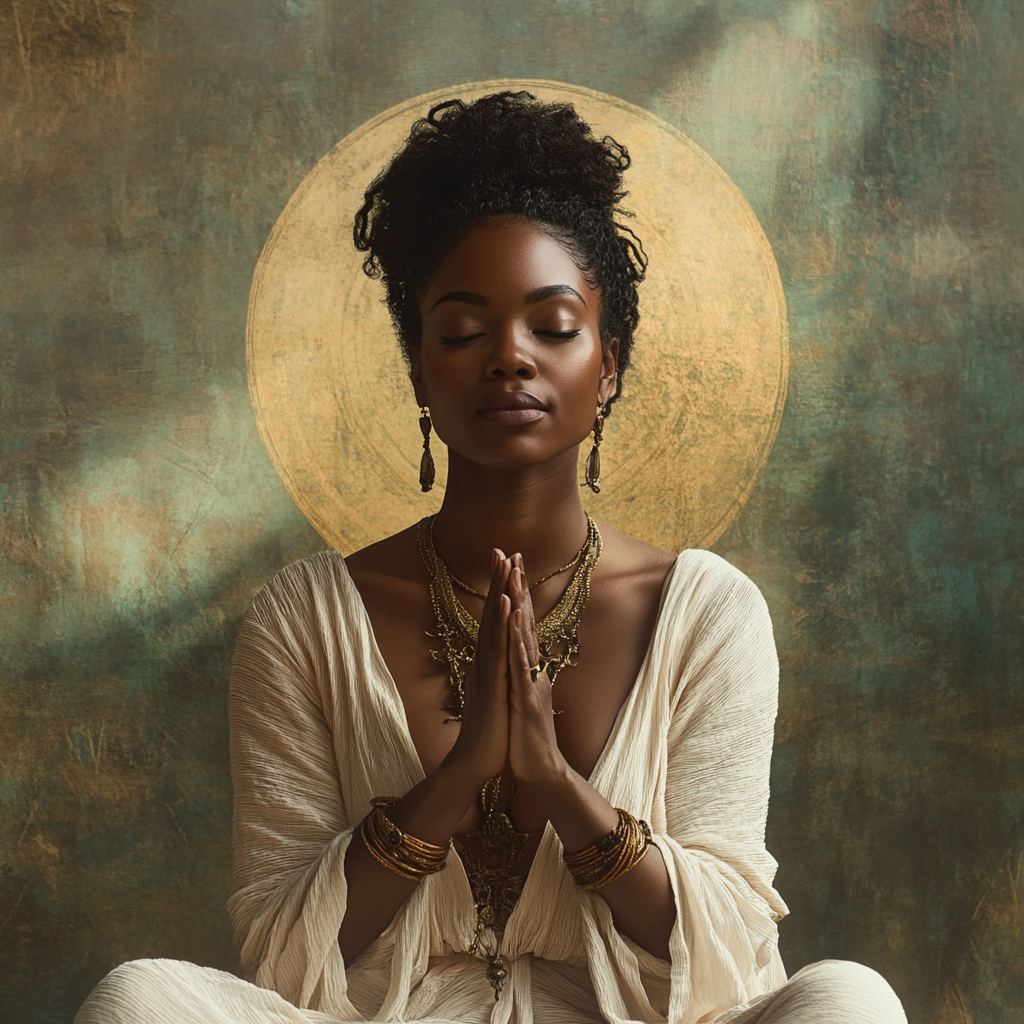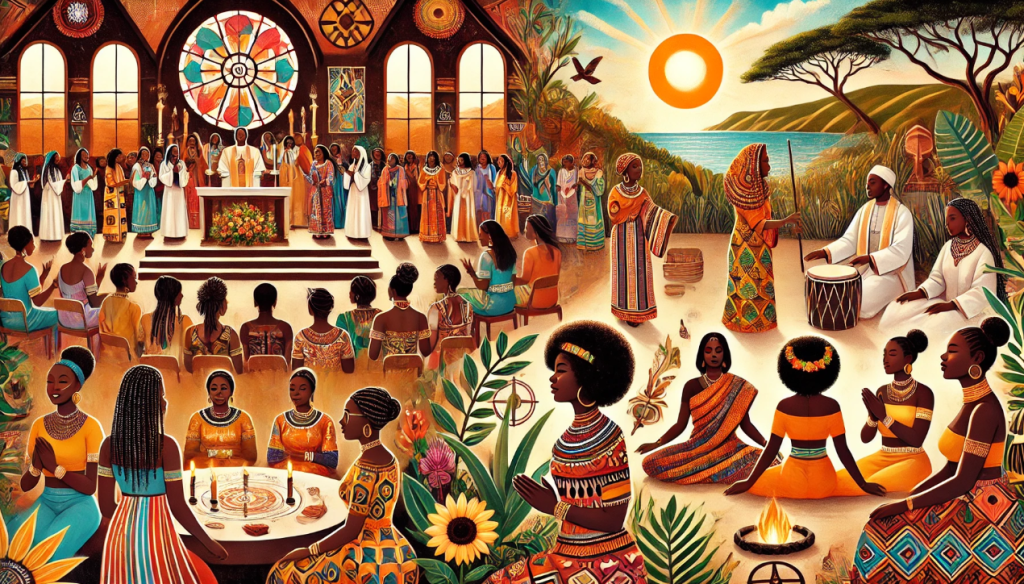Summary
In Black culture, religious and spirituality are not only sources of strength and comfort but also fundamental pillars that support identity, resilience, and unity. They offer both a community framework and an individual pathway to personal peace, shaping everything from values to mental well-being. Their impact reaches across continents, creating a universal thread connecting Black communities through shared beliefs, practices, and traditions.

Introduction
For Black millennial women, religious and spirituality are more than just traditions passed down through generations. They’re pillars of strength, resilience, and community. Religious and spirituality aren’t just words; they’re life-defining experiences that shape our identities, guide our values, and keep us connected to something bigger. In this article, we’ll explore the beautiful role religious and spirituality play in Black cultural practices, helping us see how these two elements serve as a compass, especially in times of adversity. So, let’s dive into the richness of religious and spirituality within Black culture and discover their unique roles.
What Do We Mean by “Religious” and “Spirituality”?
Defining Religious
In simple terms, religious refers to practices connected to an organized belief system, often involving communal worship and specific rituals. For many Black communities worldwide, religious practices provide a framework for understanding life, rooted in sacred texts, leaders, and doctrines. Religious tradition is the Sunday mornings spent in vibrant church pews, the hymns that touch your soul, and the pastor’s sermon that somehow speaks right to what you needed to hear. It’s structured, shared, and a collective experience that unites Black families across generations.
Defining Spirituality
On the other hand, spirituality takes a more personal approach. It’s the part of us that seeks a deeper connection with something beyond the physical, often manifesting as an internal journey of self-discovery and meaning. Spirituality isn’t bound by institutions or dogma; it’s flexible, individual, and can include practices like meditation, mindfulness, or even just appreciating a quiet moment in nature. In essence, spirituality empowers us to find peace within ourselves and connect to our own sense of purpose.
1. Religious and Spirituality: Classifying Their Roles in Black Cultural Practices
Black culture weaves both religious and spirituality into the fabric of daily life, but they serve different roles. Religious practices often provide structure and shared values within the community, while spirituality offers personal growth and reflection. This dual approach lets us navigate both collective and individual journeys—keeping us close to each other while allowing room for personal growth.
2. How Religious and Spirituality Show Up in Everyday Life
Both religious and spirituality influence Black culture in unique ways. From weddings and funerals to the little moments in between, they provide a roadmap, guiding us through life’s highs and lows. Think of Sunday family dinners where everyone gathers to discuss their lives, grounding each other with a prayer before parting ways. Or the times we draw inward, seeking solace in spiritual practices during difficult times.
3. FAQs on Religious and Spirituality in Black Culture
Q: Can you be religious without being spiritual?
A: Yes, you can! Being religious often means adhering to practices and beliefs associated with a specific faith, while spirituality is more about your inner journey. Many people identify as religious but may not consider themselves particularly spiritual.
Q: Is spirituality necessary if I already have religion?
A: Many find that religious beliefs satisfy their spiritual needs, but others feel spirituality offers a more personal touch. Spirituality can often complement religious beliefs, adding a layer of personal connection.
Q: Why do Black communities place such importance on these aspects?
A: Historically, religious and spirituality have been vital tools for resilience and unity in Black communities. These practices helped foster strength and a sense of identity, especially during times of oppression.
4. Cause and Effect: How Religious and Spirituality Shape Black Identity
The roles of religious and spirituality go beyond worship and meditation. They mold character, cultivate community support, and provide a sense of belonging. Religious practices bring Black communities together, whether it’s through weekly church services, festivals, or charity events, creating an extended family network. Spirituality, meanwhile, encourages personal resilience, often guiding people to find inner peace during challenging times.
Both religious and spirituality practices also have a profound impact on mental health. Studies show that people who actively engage in religious or spiritual practices experience lower levels of depression and anxiety. This phenomenon isn’t just about coping; it’s about fostering resilience, a trait deeply embedded in Black culture.

5. Comparison: Religious and Spirituality Across African Families, African American Families, and Black Communities Worldwide
While religious and spirituality are present across Black communities globally, there are regional nuances in how they are practiced:
- African Families: For many African families, religious traditions intertwine with cultural practices, often mixing Christianity or Islam with indigenous beliefs. It’s common to see spiritual elements in daily life, from prayer rituals to community gatherings centered around ancestral respect.
- African American Families: For African Americans, especially in the U.S., the Black church is a cornerstone of community life. The church is not only a place for worship but also a safe haven, a meeting ground, and a platform for social and civil rights movements. The unique blend of religious and spirituality in African American families provides both personal and communal support.
- Black Families Around the Globe: In regions like the Caribbean, Afro-Brazilian, and Afro-Latinx communities, religious and spirituality take on a different flavor, often combining Catholic traditions with African spiritual practices. Here, religious and spirituality are woven into both personal and communal experiences, creating a dynamic approach to worship.
6. List: Key Roles of Religious and Spirituality in Black Culture
- Promotes Resilience: Through religious and spirituality, individuals gain the mental fortitude to navigate life’s challenges.
- Encourages Community Bonding: Religion, especially, fosters unity by gathering people for worship, celebrations, and social causes.
- Provides a Moral Compass: Both religious and spirituality help instill values and principles that guide decision-making and behavior.
- Mental Health Support: Both religious and spirituality offer a sense of peace, hope, and resilience, contributing positively to mental health.
- Celebrates Black Identity: These practices honor Black heritage and instill pride in cultural roots.
7. Sequence: How Religious and Spirituality Evolve Throughout a Lifetime
Religious and spirituality practices often shift as we go through life stages. Childhood is typically marked by family-oriented religious practices, like attending church. Young adulthood often becomes a period of exploration, where many of us start seeking spiritual independence, perhaps trying different practices. By adulthood, these beliefs and practices have often become personalized, blending both traditional and individualistic approaches.
Conclusion
Religious and spirituality play unique yet complementary roles in Black cultural practices, shaping everything from personal identity to community values. By fostering resilience, creating bonds, and nurturing individual growth, these practices are a powerful resource for Black communities worldwide. They’re the strength behind the smiles, the unspoken guidance in times of doubt, and the shared moments of joy and sorrow. Whether through structured religion or personal spirituality, Black culture shines brightly, strengthened by these enduring practices.


